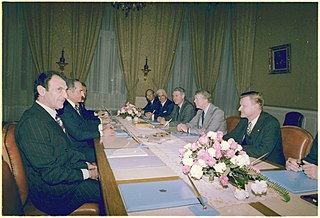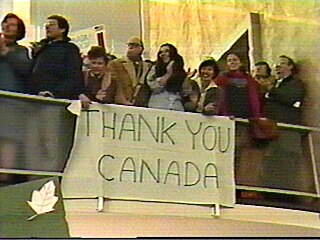
On November 4, 1979, 52 United States diplomats and citizens were held hostage after a group of militarized Iranian college students belonging to the Muslim Student Followers of the Imam's Line, who supported the Iranian Revolution, took over the U.S. Embassy in Tehran and seized hostages. A diplomatic standoff ensued. The hostages were held for 444 days, being released on January 20, 1981.

Kenneth Douglas Taylor, was a Canadian diplomat, educator and businessman, best known for his role in the 1979 covert operation called the "Canadian Caper" when he was the Canadian ambassador to Iran. With the cooperation of the American Central Intelligence Agency, Taylor helped six Americans escape from Iran during the Iran hostage crisis by procuring Canadian passports for the Americans to deceive the Iranian Revolutionary guard by posing as a Canadian film crew scouting locations. Before the escape, the six Americans spent several weeks hiding in the homes of Taylor and another Canadian diplomat, John Sheardown.

William Healy Sullivan was an American Foreign Service career officer who served as ambassador to Laos from 1964 to 1969, the Philippines from 1973 to 1977, and Iran from 1977 to 1979.

Thomas Reeve "Tom" Pickering is a retired United States ambassador. Among his many diplomatic appointments, he served as U.S. Ambassador to the United Nations from 1989 to 1992.

Iran–United Kingdom relations are the bilateral relations between the United Kingdom and Iran. Iran, which was called Persia by the West before 1935, has had political relations with England since the late Ilkhanate period when King Edward I of England sent Geoffrey of Langley to the Ilkhanid court to seek an alliance.

The "Canadian Caper" was the joint covert rescue by the Canadian government and the CIA of six American diplomats who had evaded capture during the seizure of the United States embassy in Tehran, Iran, on November 4, 1979, after the Iranian Revolution, when Islamist students took most of the American embassy personnel hostage, demanding the return of the US-backed Shah for trial.

Lowell Bruce Laingen was an American diplomat who served as the United States Ambassador to Malta from 1977 to 1979. Laingen is best known for having been the most senior American official held hostage during the Iran hostage crisis, while serving as the chargé d'affaires at the U.S. Embassy in Tehran.
Richard Ivan Queen was born in Washington D.C. and worked for the U.S. State Department as Vice Consul at the U.S. Embassy in Tehran, Iran. On November 4, 1979, he was among the 66 hostages taken by Islamic militants calling themselves the Muslim Student Followers of the Imam's Line, an event commonly known as the Iran hostage crisis.

The Embassy of the United States of America in Tehran was the United States of America's diplomatic mission in the Imperial State of Iran. Direct bilateral diplomatic relations between the two governments were severed following the Iranian Revolution in 1979, and the subsequent seizure of the embassy in November 1979.

Richard Henry Morefield was an American diplomat who served in the United States Foreign Service. He was one of the 66 staff members at the American embassy in Tehran who were taken captive by a militant Islamist student group called the Muslim Student Followers of the Imam's Line on November 4, 1979, in what became known as the Iran hostage crisis. He was one of 52 Americans who were held as a hostage for 444 days, until negotiations for the remaining captives being held hostage were concluded with the signing of the Algiers Accords on January 19, 1981, with their release coming the following day.

The Former Embassy of Iran in Washington, D.C. was the Imperial State of Iran's diplomatic mission to the United States. Direct bilateral Iran–United States relations between the two governments were severed following the Iranian Revolution in 1979, and the subsequent seizure of hostages at the U.S. Embassy in Tehran, Iran.

Argo is a 2012 American historical drama thriller film directed, produced and led by Ben Affleck. The screenplay, written by Chris Terrio, was adapted from the 1999 book of the same name by the U.S. Central Intelligence Agency operative Tony Mendez, his memoir The Master of Disguise, and the Wired article by Joshuah Bearman, "The Great Escape: How the CIA Used a Fake Sci-Fi Flick to Rescue Americans from Tehran". The film deals with the "Canadian Caper", in which Mendez led the rescue of six U.S. diplomats from Tehran, Iran, under the guise of filming a science fiction film during the 1979–1981 Iran hostage crisis.
Gholhak Garden is a British overseas diplomatic compound in the northern Tehran neighborhood of Gholhak in Iran, about 3 miles (4.8 km) from the centre of Tehran. The sprawling tree-lined site, bordered by high walls, measures 200,000 square metres and houses British diplomats and their families. The compound is also home to the Tehran War Cemetery. The site has been at the centre of diplomatic controversy between Britain and Iran over ownership and management of the grounds.

The 2011 attack on the British Embassy in Iran was a mob action on 29 November 2011 by a crowd of Iranian protesters who stormed the embassy and another British diplomatic compound in Tehran, Iran, ransacking offices and stealing documents. One small building was set on fire during the incident and several people were injured. The Iranian government publicly condemned the violence.

The Embassy of the United Kingdom in Tehran is the United Kingdom's diplomatic mission to the Islamic Republic of Iran. It is located at 198 Ferdowsi Avenue in Tehran.

Hamid Aboutalebi is a former Iranian diplomat and ambassador. Aboutalebi was previously ambassador of Iran to Australia, the European Union, Belgium, Italy, and a political director general to Iran's Ministry of Foreign Affairs. He was part of Iran's UN delegation in New York City in the 1990s.

Public Law 113-110 is a law that "ban(s) Iran's new United Nations ambassador, who has ties to a terrorist group, from entering the United States." Iran's proposed ambassador, Hamid Aboutalebi, is controversial due to his involvement in the Iran hostage crisis, in which a number of American diplomats from the US embassy in Tehran were held captive from 1979 until 1981. Aboutalebi said he did not participate in the takeover of the US embassy, but was brought in to translate and negotiate following the occupation. President Barack Obama told Iran that Aboutalebis selection was not "viable" and Congress reacted by passing this law to ban his presence in the United States.

This is a timeline of the Iran hostage crisis (1979–1981), starting from the Shah Mohammed Reza Pahlavi's leaving of Iran and return of all hostages to the United States.

Victor L. Tomseth is a former American diplomat and U.S. Ambassador (1993–1996) to Laos. He was Deputy Chief of Mission in Tehran, Iran and was among the Americans taken hostage by the Iranians from 1979 to 1981.

















